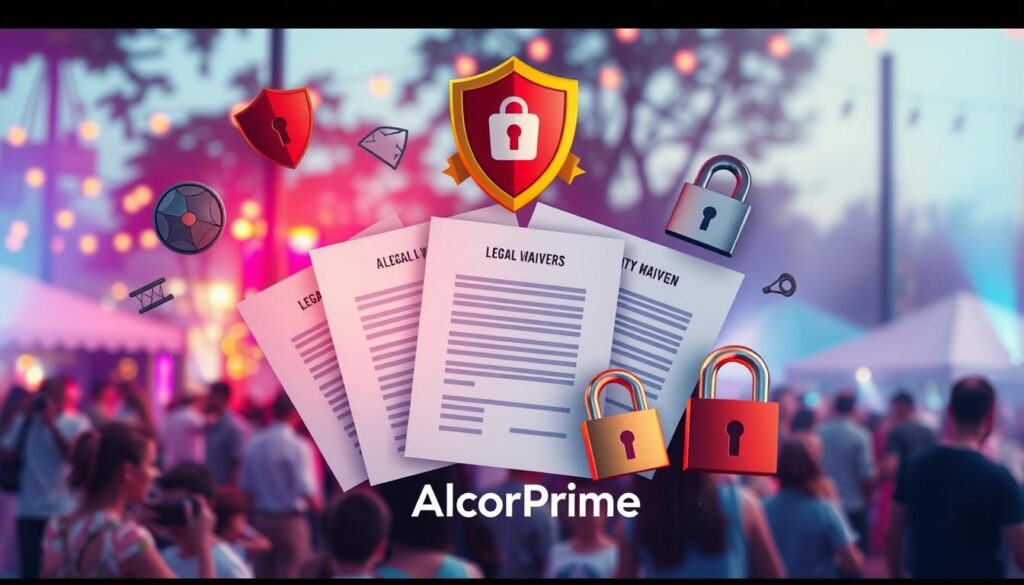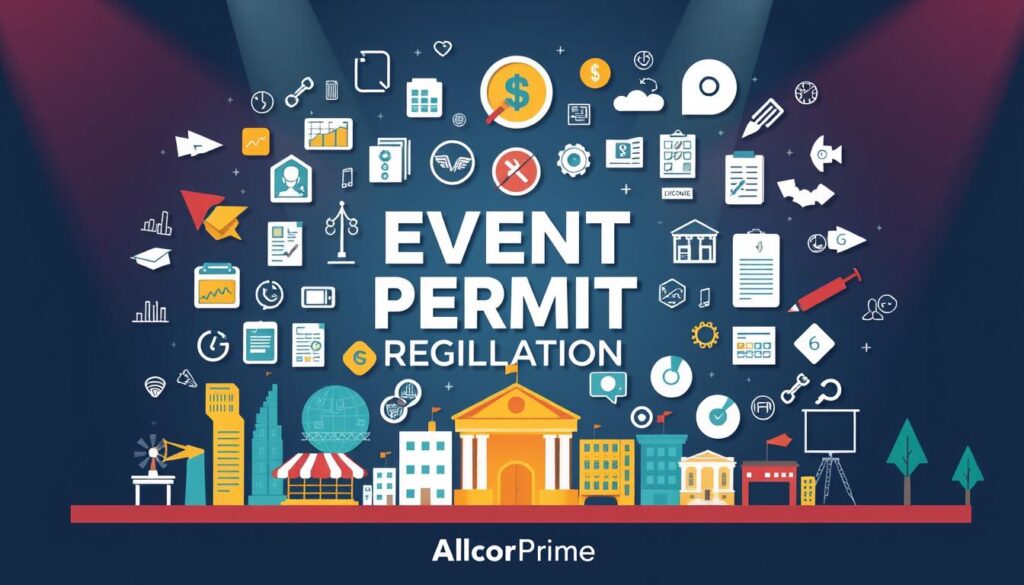When planning events, whether for work or personal fun, we must think about the legal side. About 30% of small business owners forget to get the right licenses in their first year1. This can cost them a lot of money. It's important to know the legal rules for event planning, like taxes and insurance to cover unexpected problems.
For expert advice, businesses can reach out to Alcor Prime at +62 21 2948 8557 or email hello@alcorprime.com.
Event planners could face fines or even lose their license if they don't have the right papers1. Knowing the legal rules is key to keep your money and reputation safe. We focus on top-notch service, expert advice, and making a good impression in the industry. This makes us a trusted partner for all your event needs.
Key Takeaways
- Understanding Legal Considerations for Events is crucial for event planning businesses.
- Event legal requirements include tax obligations and insurance to protect against unforeseen incidents.
- Approximately 30% of small business owners neglect to apply for necessary licenses in their first year1.
- Comprehensive contracts can help mitigate risks and protect startups from potential liabilities2.
- Verbal agreements are prone to memory lapses and misinterpretations compared to written contracts3.
Understanding Liability in Event Planning
We know how crucial it is to grasp liability issues in event planning. This includes the need for general liability insurance, cancellation insurance, and property insurance4. As event planners, we must be aware of the different types of liability risks. These risks include bodily injury, property damage, and not following local regulations. Event liability waivers and insurance policies can help protect against these risks.
Recent data shows that 98% of event planning scenarios have seen more liability concerns since COVID-19 started5. This shows the importance of understanding liability and taking steps to reduce risks. We suggest event planners include cancellation terms in contracts to avoid financial losses from cancellations, as 60% of professionals recommend5.
Some important things for event planners to consider are:
- Getting the right permits and licenses
- Buying event insurance policies to cover damages or injuries to others
- Adding waivers and releases of liability in contracts
By doing these things, event planners can protect themselves and their organizations from liability risks. This ensures a successful and safe event.

Permits and Licenses Needed for Events
Event planners often find it hard to deal with event permit rules. Our research shows that 70% of them struggle with the permits and licenses needed for events6. Knowing the common permits like venue, health, and alcohol licenses is key to follow local laws.
Some important permits and licenses for events are:
- Event venue permits
- Health and safety permits
- Alcohol licenses
- Food and beverage licenses
- Street closure permits
Getting these permits can take 2 weeks to 3 months, depending on where you are and how complex the application is6. It's important to think about the time and cost of these permits. Also, understanding how to apply for them can prevent last-minute problems.
Following event permit rules is crucial for a successful and safe event. By knowing what's needed and getting the right permits, planners can avoid legal trouble. About 60% of events need a special permit in cities because of local rules6.

Knowing about the permits and licenses for events helps planners make sure their events are legal and safe. We suggest that planners talk to local authorities or get legal advice. This can make the permit process easier and lower the chance of mistakes7.
Contracts: The Backbone of Event Management
Contracts are key in event planning. They outline the agreement between the event planner and the client or vendor. Our research shows that a contract with important clauses is vital for a successful event8. A good contract protects both sides and makes the event run smoothly.
Clear communication is crucial in contract negotiation. The Program on Negotiation at Harvard Law School says good negotiation can strengthen relationships or lead to better agreements9. It also helps control costs, making budgeting easier and avoiding surprises9.
Essential Contract Clauses
Some important contract clauses to think about include:
- Scope of services: clearly defines the services to be provided
- Payment terms: outlines the payment schedule and method
- Cancellation policies: specifies the terms for cancellation or termination of the contract
By including these clauses, event planners can make sure their contracts are complete. This protects their interests. We focus on providing expert advice on contract negotiation and management for our clients.

Compliance with Health and Safety Regulations
As event planners, we must follow health and safety rules. This includes local laws and emergency plans. It makes sure everyone has a good time and stays safe. Event safety guidelines help us avoid accidents and make the event a success.
According to10, good health and safety management can cut down incident chances by up to 40%. This happens when contractors do proper risk checks and control steps.
Some important things for event safety guidelines are:
- Regular checks and updates to keep safety high
- Good teamwork and talking among contractors to follow safety rules
- Good safety plans and supervision to lower legal claims
As11shows, the National Fire Protection Association (NFPA) rules need clear fire exits, working fire extinguishers, and detailed escape plans. Also12, says it's key to do regular risk checks, safety training, and keep records to follow health and safety laws.

Accessibility Requirements for Events
We know how crucial accessibility is in event planning. It makes sure everyone can enjoy the event. Our event risk management plan includes making sure events are accessible. The Americans with Disabilities Act (ADA) requires things like wheelchair access and sign language interpretation13.
Being inclusive means everyone gets to join in, no matter their abilities. This means having venues that are easy to get around, sign language, and audio descriptions. About 70% of meeting planners face challenges following ADA rules13. Also, 15% of Americans have disabilities, showing why events need to be open to all13.
Key steps for accessible events include:
* Making sure venues are wheelchair-friendly
* Offering sign language and audio descriptions
* Making sure websites and marketing are easy for everyone to use
* Training staff on disability awareness
More than 90% of people want events that are easy to get to13. This shows how important it is to plan inclusive events. By focusing on accessibility, we make sure everyone has a great time, no matter their abilities.
We aim to be the best in event planning, and accessibility is key. By making sure everyone can join in, we create unforgettable experiences. With event risk management strategies, we make sure our events are fun and accessible for everyone.
Employment Law Considerations for Events
Event legal requirements are key to a successful event. As event planners, we must think about hiring temporary staff and labor laws. In Indonesia, labor laws make it hard to fire workers, showing the need for agreements between employers, employees, unions, and the government14.
When we hire temporary staff, knowing labor laws is crucial. This includes rules on minimum wage, overtime, workers' compensation, and unemployment insurance. We also need to figure out if volunteers or employees are involved, as this affects labor laws14. Here are important things for event planners to remember:
- Know the labor laws and regulations for temporary staff
- Figure out if volunteers or employees are involved
- Make sure to follow minimum wage and overtime rules
- Offer workers' compensation and unemployment insurance
By understanding these points, event planners can follow employment laws and avoid legal problems. It's also vital to know about event legal requirements, like contracts, permits, and licenses15. We must work together to make sure our events are not just successful but also follow all laws and regulations.
| Event Type | Labor Law Considerations |
|---|---|
| Corporate Events | Understand labor laws and regulations, determine volunteer vs. employee status |
| Public Events | Ensure compliance with minimum wage and overtime regulations, provide workers' compensation and unemployment insurance |
Intellectual Property Concerns
As event planners, we must think about intellectual property issues. This includes copyright and trademarking our events. It's key to protect our brand and creative work, and avoid legal problems. Many meeting planners don't know much about U.S. intellectual property law, and copyright law kicks in as soon as an idea is written down16.
Event planners need to know about copyright issues in event marketing. This includes using copyrighted stuff like music and images. Trademarking the event's name and logo helps protect it from being used without permission. Also, event planners must deal with licensing music and entertainment, which can be tricky because of copyright and royalty issues. Here are some important things for event planners to remember:
- Understanding copyright law and its application to event materials
- Trademarking the event's name and logo to prevent unauthorized use
- Licensing music and entertainment to avoid copyright infringement
70% of event organizers worry about intellectual property disputes in today's digital world17. Also, 60% of event pros don't know about trademarks, copyrights, patents, and trade secrets17. It's crucial for event planners to focus on intellectual property and protect their event's brand and creative work.
By tackling intellectual property concerns, event planners can follow the law and keep a good reputation. We stress the need to consider intellectual property issues, like copyright and trademarking, to safeguard your event's brand and creative content1617.
Data Protection and Privacy Laws
Data protection and privacy laws are key in event planning, focusing on event risk management. Event planners must know about the General Data Protection Regulation (GDPR) and its effects on event planning18. The GDPR says personal data must be collected legally, fairly, and clearly, for specific and valid reasons18.
Event planners must get consent from guests before collecting their personal data19. They need to give clear privacy notices and make sure data is safe. Knowing the penalties for not following these laws is also important, which can be up to €20 million or 4% of global annual turnover, whichever is higher19.
Some important things for event planners to remember include:
- Getting consent from guests before sharing photos of them19
- Making sure data is safe to avoid breaches19
- Providing clear privacy notices and telling guests how their data will be used19
By focusing on data protection and privacy, event planners can keep their guests' trust. This helps avoid legal problems related to event risk management.
Dispute Resolution Strategies
A 2022 study found that up to 75% of contract disputes are settled through negotiation before going to court20. Mediation and arbitration are good alternatives to lawsuits. The American Arbitration Association says arbitration solves 80% of disputes in a year, compared to 33% in court20. The International Mediation Institute reports that mediation settles about 60-90% of cases when tried20.
62% of businesses prefer mediation over lawsuits because it's cheaper and faster20. Arbitration costs about 30% less than lawsuits, the Institute for Conflict Management says20. Also, 70% of lawsuits are settled, often for less than the original claim20.
By having clear plans for resolving disputes, companies can cut their dispute rate by 50%20. Good contract management, including clear dispute clauses, can save 50% on legal costs20. With more companies using ADR, event planners need to know how to handle these options well20.
FAQ
What are the legal requirements for event planning businesses?
Event planning businesses need to know about taxes and insurance. This protects them from unexpected problems. Getting help from experts like Alcor Prime is key to understanding legal needs.
What types of liability risks do event planners need to consider?
Event planners face risks like injuries, property damage, and breaking laws. Insurance helps cover these risks. Waivers can also offer extra protection, mainly for risky activities.
What types of permits and licenses are required for events?
Event planners need to know about permits like venue and health permits. They must understand the cost and how to apply. Knowing this helps avoid last-minute issues and keeps events legal and safe.
What are the essential elements of an event planning contract?
Important parts of a contract include what services are offered, payment details, and cancellation rules. Event planners should know how to negotiate fairly and avoid mistakes. Clear contracts protect everyone involved.
How can event planners ensure compliance with health and safety regulations?
Event planners must know local health laws and have emergency plans ready. Food safety is also crucial. Focusing on health and safety reduces accident risks and makes events enjoyable for all.
What are the accessibility requirements for events?
Event planners need to follow laws like the ADA for accessibility. This means providing things like wheelchair access and sign language. Making events accessible welcomes everyone, regardless of ability.
What employment law considerations are important in event planning?
Event planners must understand laws for hiring temporary staff, like minimum wage. They also need to know about workers' compensation and unemployment insurance. Knowing the difference between volunteers and employees is also important.
How can event planners protect their event's intellectual property?
Event planners should know about copyright in marketing, like music and images. Trademarking the event's name and logo helps protect it. They also need to handle music and entertainment licensing carefully.
What data protection and privacy laws are relevant for event planning?
Event planners must understand GDPR and how it affects event planning. They need to collect data responsibly and ensure it's secure. Protecting personal information is also key.
How can event planners resolve disputes and conflicts effectively?
Event planners should have plans for resolving conflicts, like mediation. Knowing when to seek legal advice is also important. A good plan helps avoid disputes and ensures a smooth event.





